Larissa Phillips is a remarkable woman.


Among other things, she is founder of the Volunteer Literacy Project, a nonprofit organization devoted to teaching adults how to read. The “Rex Runs Off!” books for children were authored by her, along with “Decodable Bile Stories,” selected tales adapted from Genesis using structured phonics to help beginning adult readers. She also likes to eat meat, so she learned how to kill animals humanely.[1]
Born in the late sixties, Ms. Phillips was raised by activist parents in New Rochelle, New York, a town about 25 miles north of New York City. From an early age, Larissa and her siblings were dragged to countless protest marches, compelled to participate in boycotts of politically incorrect products, and were taught to hate America and everything it stands for. Injustices wrought by the United States were frequent dinner-time conversations. So, displaying the flag on the Fourth of July—or any other day of the year, for that matter—was anathema. Patriotism was “for other people, other generations,” but not progressives.[2] Lamentably, this attitude is quite common among many progressives today.[3]
Ms. Phillips imbibed her parents’ contempt for the American way of doing things. When her own children reached school age, she scoured the public schools in her Brooklyn neighborhood looking for certain “nonnegotiables,” including whether pupils had to recite the Pledge of Allegiance every morning, a concern shared by most of her progressive friends. “Requiring the Pledge would be tone-deaf to the problems with American culture,” she claimed.[4]
This jumped out at me—but not for a reason that would occur to most people. You see, no public school in the United States can require a student to stand and recite the Pledge of Allegiance. So, Larissa had nothing to worry about.
But this has not always been the law of the land.
* * * * *
One October morning in 1935, a fifth-grader by the name of William Gobitis, son of a local grocer in Minersville, Minnesota, refused to salute the flag during the ritual Pledge of Allegiance at his elementary school.[5] Much to the young boy’s surprise, his teacher tried to force his arm up, but William successfully resisted by holding on to his pocket. The next day his eleven-year-old sister, Lillian, did likewise. “The Bible says at Exodus chapter 20,” she explained to her teacher, “that we can’t have any other gods before Jehovah.”[6]
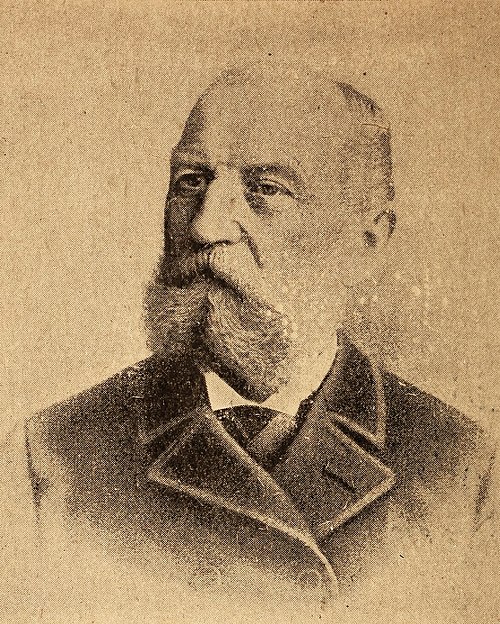
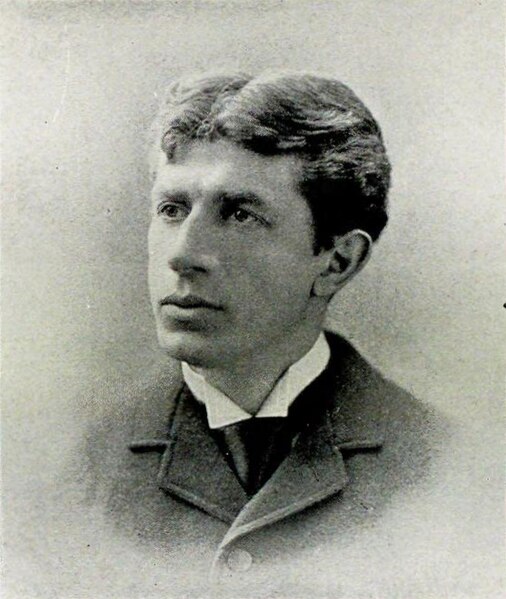
The Gobitis children, you see, were Jehovah’s Witnesses, and one of the faith’s national leaders, Judge George Rutherford, had given a speech earlier that year where he denounced the “Heil Hitler” salute: “All people who have faith in God,” should only pledge their fealty to “Jehovah and Christ Jesus.” Young Witnesses chose apply this logic to the Pledge of Allegiance, which Judge Rutherford heartily endorsed.[7]
As you probably have already surmised, the intransigence of the Gobitis’ children created a bit of a stink. Some of Lillian’s classmates threw rocks at her and shouted, “Here comes Jehovah!” The adults in the community likewise heaped abuse on the Gobitis family. A mob threatened to destroy the father’s grocery store,[8] which was then boycotted with the encouragement of the local Catholic Church.[9]
The school district decided to resolve this issue by enacting a regulation making the customary flag salute mandatory. But the Gobitis children still refused to comply, leading to their expulsion. Having run out of options, the family turned to their faith’s national legal counsel who agreed to plead their cause before Lady Justice.[10]
The children prevailed in the lower courts, but by the time the case reached the U.S. Supreme Court in 1940, America’s participation in the brewing world war seemed inevitable. So, patriotism took on a different meaning. Judge Rutherford argued the Gobitis children’s case before the Court, but a by a vote of 8 to 1, they lost. All five of Roosevelt’s Court appointees were in the majority and Justice Felix Frankfurter, one of the most liberal jurists in the Court’s history, authored the majority opinion. And it was shameful.
“National unity,” he posited, “is the basis of national security,” an interest “inferior to none in the hierarchy of legal values.” An individual’s refusal to recite the Pledge would be tantamount to treason, he argued.[11] “The flag is a symbol of our national unity, transcending all internal differences, however large, within the framework of our Constitution,” Frankfurter declared. Adolf Hitler could not have said it better.[12]
Frankfurter went on to say that the school board’s regulation requiring each student to stand and recite the Pledge was perfectly rational and applied to each student in equal measure. This allowed him to claim he was respecting civil liberties while not interfering with a “legislative” judgment, the hallmark of judicial restraint.
But the lone Republican appointee on the Court, Harlan Fisk Stone, would have none of it. To defer to the “legislature’s” (i.e., the school board’s) judgment, he asserted in his dissenting opinion, “seems to me no more than a surrender of the constitutional protection of the liberty of small minorities to the popular will.”[13]
As the author and scholar Noah Feldman observed, the liberal justices “had been presented with an opportunity to enshrine the liberal value of tolerance into constitutional doctrine…,” and blew it.
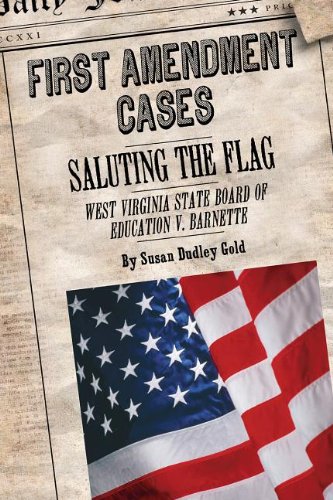
Three years later, with an alacrity unprecedented in Supreme Court history, the Court in West Virginia State Board of Education v. Barnette, by a vote of 6 to 3, reversed its decision in Gobitis. Justice Robert H. Jackson, writing for the majority, went beyond the narrow issue presented by the case to assert that the ideological dogmatism espoused by the Court in its earlier opinion is antithetical to the principles of the First Amendment. He then added this eloquent exclamation point:
If there is any fixed star in our constitutional constellation, it is that no official, high or petty, can prescribe what shall be orthodox in politics, nationalism, religion, or other matters of opinion or force citizens to confess by word or act their faith therein. If there are any circumstances which permit an exception, they do not now occur to us.[14]
* * * * *
Recently, the Supreme Court found it necessary to reacquaint Montgomery County, Maryland with the constitutional principles espoused by Justice Jackson and enshrined in the free-exercise of religion clause in our First Amendment.
In 2022, the Montgomery County Board of Education introduced several inclusivity books for children in pre-K through the fifth grade. If your “spidey sense” began to tingle when you saw the word “inclusivity,” go to the head of the class.
You see, these books teach nothing about sharing, kindness and respect; rather they promote topics such as gender transitions, pride parades and pronoun preferences. For example, one book, Pride Puppy, invites three- and four-year olds—yes, you read that right—to search for images such as a “drag queen,” “underwear,” a picture of a well-known LGBTQ activist and sex worker, and, my personal favorite, “leather!” Another book asks children to think about what it means to be “transgender” or non-binary, while teachers are instructed to remind students “that doctors only ‘guess’ at a baby’s sex at birth.”[15]
The Board, knowing that some unenlightened families would object to this curriculum, adopted an opt-out policy allowing parents to excuse their children from school’s lessons on human sexuality. This, in fact, is required by Maryland law and is standard practice in 47 states. Indeed, Montgomery County—the most religiously diverse county in the nation[16]—allows parents to opt their children out of any classroom discussion that conflicts with their religious beliefs. Or it least at did until the spring of 2023.[17]
When it became apparent that virtually everyone had chosen to opt out of this curriculum (go figure), the Board decided these children and their parents were going to be force-fed this radical ideology—their religious beliefs be damned! “By bureaucratic sleight-of-hand,” the County re-purposed the offensive part of the material and transferred it to a curriculum where opt-outs are not permitted.[18]
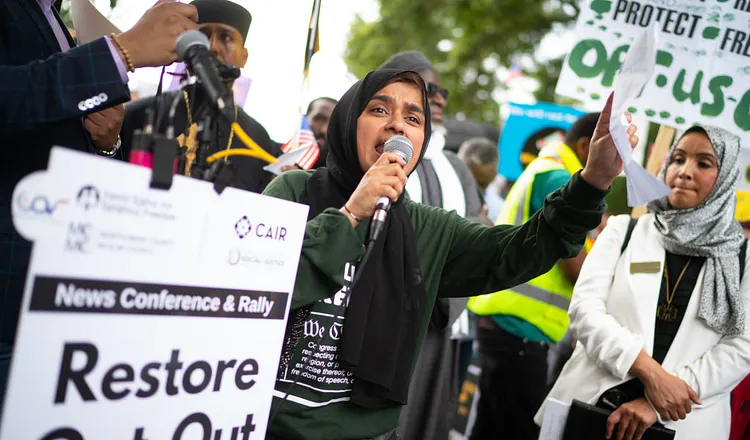

Much to the surprise of the Board, however, the parents who had previously opted out were not grateful for the guidance they had received from their intellectual betters. Indeed, they were irate. Scores and then hundreds of families staged protests and testified at every school board meeting[19]
But the bureaucrats and politicians didn’t budge. Indeed, they were contemptuous of the parents’ concerns. For example, Montgomery Councilmember Kristin Mink responded to the objections voiced by several Muslim families by accusing them of being on “the same side as white supremacists.”[20] And then several school board members denounced the parents as “hate” promoting and “xenophobes.”[21] This came as no surprise, however. After all, what do the intellectually indolent do when defending the indefensible? They play the race card.
A lawsuit against the school was filed by three families, two Muslim and one Catholic. It was backed by a diverse coalition of believers: Catholics, Muslims, Ethiopian Orthodox Christians, and—my tribe—Latter-day Saints. An Ethiopian Christian mother with a child in the first grade perfectly captured the sentiments of all the parents when she said, “[The School Board] is trying to replace our values. … It’s a religion for them. I feel like as a Christian, my kids are getting rebaptized in another religion.” William Haun, senior legal counsel for the families said, “For all they disagree about theologically, they agree on this. And the Constitution agrees with them too.”[22]
Two Maryland courts disagreed with Mr. Haun’s interpretation of the Constitution. A week ago, however, the U.S. Supreme Court reversed those decisions. It reminded Montgomery County that the Court has long recognized the rights of parents to direct their children’s religious upbringing. In support of this proposition, the Court cited its opinion in West Virginia Bd. Of Ed. V. Barnette, the above-referenced case involving the Jehovah’s Witnesses and the Pledge of Allegiance that restored to the Gobitis children and other members of their faith the right to refrain from reciting the Pledge.[23]
* * * * *
So, let us return to Larissa Phillips and her mixed feelings about the country where she resides. While in college, she and her friends all thought America “was a country of hypocrites, racist and murders.” When they travelled around Europe in early twenties, her friends and she thought “it the worst insult to be identified as an American.” But after she married and became a parent, she felt increasingly uncomfortable with this simplistic assessment.[24]
For starters, she resolved not to subject her kids to the activist childhood she had compelled to endure. Burdening a child with such animosity and guilt about anything, especially the nation where they live, would be wrong. But she didn’t want them to be patriots, either. How can anyone express enthusiasm for such a patently flawed country?[25]
While she was wrestling with this question, something happened which triggered in her feelings about America she had never felt before: 9/11. In the days that followed the terrorist attack, ash from the fires covered the backyard of her home in Brooklyn. She then discovered that some family acquaintances had been killed in the World Trade Center. But when she saw a news segment on television where a large group of Senators on the Capitol steps spontaneously began to sing “God Bless America,” for the first time in her life she felt a powerful affection for the United States that brought tears to her eyes.[26]
Several years later, Larissa and her family moved to a rural community in Upstate New York where the political views of the local residents were the polar opposite of those of the denizens of New York City. While the local elementary school did expect her children to recite the Pledge of Allegiance, she, with very little reluctance, acquiesced. But when her daughter came home from her first day in fourth grade, she was furious with her mom. She had never heard of this ritual that everyone else knew by heart! So, Larissa set about the task of teaching her daughter the Pledge of Allegiance.[27]

And this Fourth July, she and her husband proudly displayed the American flag for the first time.
* * * * *
On one occasion in our country’s history, there was a serious debate as to whether a scheduled national election should be postponed. The year was 1864, and the outcome of the Civil War was still in doubt. Abraham Lincoln was seeking reelection and his opponent was George McClellan, a U.S. Army general who Lincoln had sacked two years before because of McClellan’s lethargy and incompetence.
McClellan had been nominated by the Democrats. The party’s platform called for a peace with the Confederacy, even if it meant the perpetuation of slavery.[28] In the summer of that year, this proposition appealed to many in the North who were tired of the war and were unsure whether the Union could be preserved.
The call for Lincoln to postpone the election on national security grounds was great; but he refused. In the early fall, the Union scored some decisive victories, sealing once and for all the fate of the Confederacy. Lincoln went on to win reelection handily.
One evening, a few days after his electoral victory, a musical ensemble appeared on the White House lawn and began to serenade him, after which the President made a short speech.
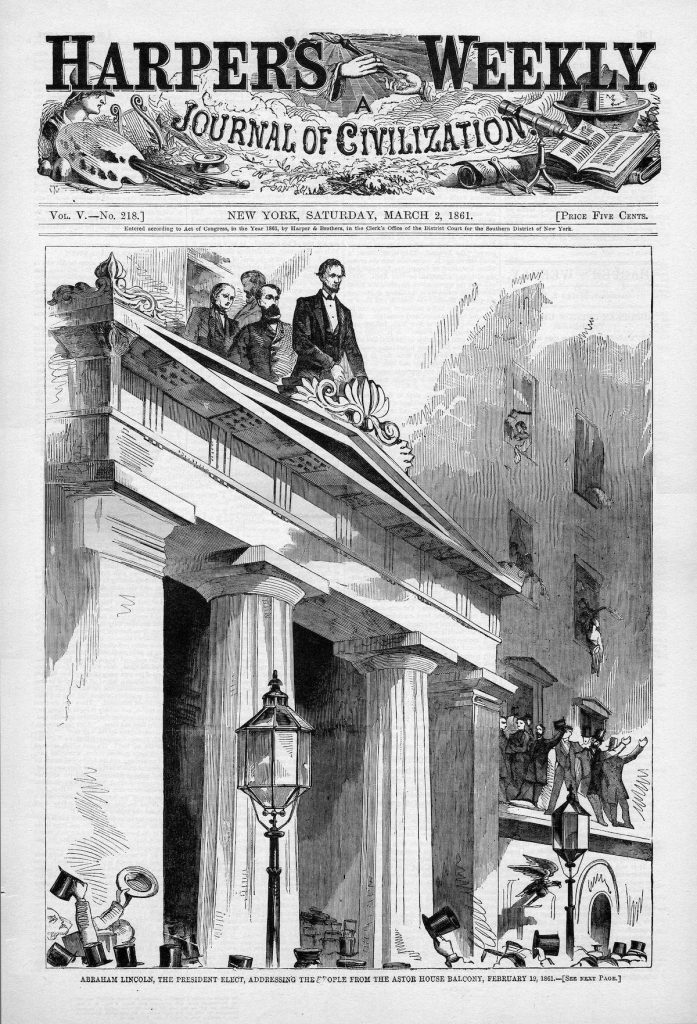
The question of the hour, Lincoln began, was “whether any government, not too strong for the liberties of its people, can be strong enough to maintain its own existence, in great emergencies.”[29] The ongoing War Between the States had put that question to the test, as did the strain of holding the recent election, which had been most contentious. “The strife of the election,” he said, was to be expected since it was “but human-nature practically applied to the facts of the case.”[30] And, human nature, he explained—contrary to the hopes and dreams of utopians around the world—will never change.
In any future great national trial, compared with the men of this, we shall have as weak, and as strong; as silly and as wise; as bad and as good. Let us, therefore, study the incidents of this, as philosophy to learn wisdom from, and none of them as wrongs to be revenged.[31]
None of them as wrongs to be revenged. What is Lincoln telling us? I believe he is saying that forgiveness is a prerequisite to patriotism and that a spirit of vengeance will corrupt our love of country and embitter our souls. And the seeds of hate we nourish within us will invariably corrupt our children, to the probable detriment of the future of our country and our standing before God.
President Lincoln then concluded his remarks, as I will conclude this essay:
“Gold is good in its place, but living, brave, patriotic men, are better than gold.”
[1] Larissa Philips, “On Killing Turkeys,” The Free Press, November 23, 2024, https://www.thefp.com/p/on-killing-turkeys-larissa-phillips, last accessed on July 6, 2025.
[2] Larissa Phillips, “I’m Finally Hanging My American Flag,” The Free Press, July 3, 2025, https://www.thefp.com/p/im-finally-hanging-my-american-flag-america-at-250, last accessed on July 6, 2025.
[3] See, e.g., Ziyad Motala, “An outdated charter: How the US Constitution enables tyranny,” TRT Global, May 14, 2025, https://trt.global/world/article/9ee4cec21e8c, last accessed on July 6, 2025; Spencer Black, “U.S. Supreme Court is corrupt, illegitimate and extremist,” The Cap Times, July 9, 2024, https://trt.global/world/article/9ee4cec21e8c, last accessed on July 6, 2025; Doug Henwood, “Take Me to Your Leader: The Rot of the American Ruling Class,” Jacobin, April 27, 2021, and Clifton Mar, A believe in meritocracy is not only false: it’s bad for you, Princeton University Press, June 22, 2020, https://press.princeton.edu/ideas/a-belief-in-meritocracy-is-not-only-false-its-bad-for-you?srsltid=AfmBOop8XUMpWQpwB3gGIiWd1xCvmMfk-K6fmlrH_5cF49JaUvcGlqkw, last accessed on July 6, 2025.
[4] “I’m Finally Hanging My American Flag,” supra.
[5] Noah Feldman, Scorpions: The Battles and Triumphs of FDR’s Great Supreme Court Justices, (New York, New York: Twelve Hatchett Book Group, 2010), p. 179.
[6] Ibid.
[7] Ibid.
[8] Ibid, p. 180.
[9] Lillian Gobitis, “The Courage to Put God First,” Awake! July 22, 1993, p 13.
[10] Ibid, p. 181.
[11] Richard A. Epstein, The Classical Liberal Constitution: The Uncertain Quest for Limited Government,” (Cambridge, Massachusetts: Harvard University, 2014), p. 477.
[12] Scorpions: The Battles and Triumphs,” p. 181.
[13] Ibid, p. 184.
[14] West Virginia State Board of Education v. Barnette, 319 U.S. 624, 642 (1943).
[15] Bethany Mandel, “The Revolt of Religious Parents in Montgomery County,” The Free Press, August 29, 2023, https://www.thefp.com/p/revolt-religious-parents-montgomery-county?utm_source=publication-search, last accessed on July 6, 2025.
[16] PRRI Staff, “2023 PRRI Census of American Religion: County-Level Data on Religious Identity and Diversity,”
[17] William J. Haun, “While Trust in Public Schools is Crumbling, Montgomery County Has an Opportunity to Lead,” RealClear Education, January 9, 2025, https://www.realcleareducation.com/articles/2025/01/09/while_trust_in_public_schools_is_crumbling_montgomery_county_has_an_opportunity_to_lead_1083577.html, last accessed on July 6, 2025.
[18] George F. Will, “The Supreme Court gets a chance to rebuke schools’ bullying wokeism,” The Washington Post, June 18, 2025, https://www.washingtonpost.com/opinions/2025/04/18/supreme-court-public-education-religious-freedom/, last accessed on July 6, 2025.
[19] “The Revolt of Religious Parents,” supra.
[20] Ibid.
[21] “The Supreme Court gets a chance,” supra.
[22] “While Trust in Public Schools is Crumbling,” supra.
[23] Mahmoud et al. v. Taylor et al., Slip Opinion, June 27, 2025, https://www.supremecourt.gov/opinions/24pdf/24-297_4f14.pdf, last accessed on July 6, 2025.
[24] “I’m Finally Hanging My American Flag,” supra.
[25] Ibid.
[26] Ibid.
[27] Ibid.
[28] “1864 Democratic Party Platform,” The American Presidency Project, https://www.presidency.ucsb.edu/documents/1864-democratic-party-platform, last accessed on July 6, 2025.
[29] Abraham Lincoln, Speeches and Writings: 1859-1865, (New York, New York: Library of America, 1989), p. 641.
[30] Ibid.
[31] Ibid.

Still reading, but had to pause and thank you … Brilliant. Why? Of course it’s well written, but, as I learned from a friend, it’s”data over dogma” y’all.
Now, back to the essay.
Very interesting and informative. You are a true thinker, scholar, and man of principle.
Your remember Senator Bob Bennett, a faithful member of the Church of Jesus Christ of Latter-day Saint’s contribution. Some say this move on his part prevented him from being re-elected and led to Mike Lee.
Senator Robert Bennett, often referred to as Bob Bennett, was a key figure in the debate surrounding the Flag Protection Act of 2005. He co-sponsored this bill, which aimed to prohibit the desecration of the American flag, alongside Senator Hillary Clinton. While the bill focused on flag desecration, it’s important to note that the term “desecration” can encompass actions beyond burning, including using the flag for clothing or napkins.
Importantly, Senator Bennett also voted against a proposed constitutional ban on flag burning, a position that put him at odds with many in his party. This stance aligns with his broader support for civil liberties, including his opposition to some wiretapping proposals by the Bush administration
Thanks, as always, Karen for your kind words and for taking the time to read my scribblings and share your thoughts. I especially appreciate the stories you shared about the late Senator of Utah, Bob Bennett.
Personally, while I do not approve of flag desecration, I am unalterably opposed to any law or constitutional amendment prohibiting or criminalizing such behavior. That conduct has rightly been considered by the courts as a form of speech or expression protected by the First Amendment. At a time when countries throughout the world have been pairing back free speech protections, we need to be diligent in our opposition to all such encroachments on our liberties in the United States.
Gosh, why you all , always write in the first person where YOU are the subject not us the reader ?
That Larissa style while writing in ,
Euphemism alert ,
‘The Free Press’ has a paywall ?
Then she blames Amerika,s woes on the
Peace hippies & the Grateful Dead ? This is to be taken as stellar prose and insight? Actually she runs a Bread and Breakfast not a Real Farm .